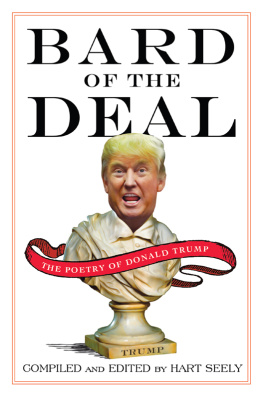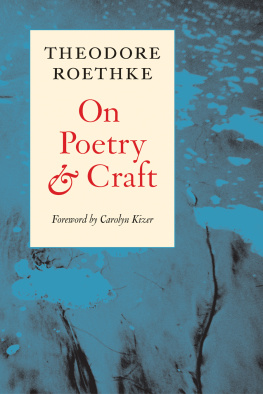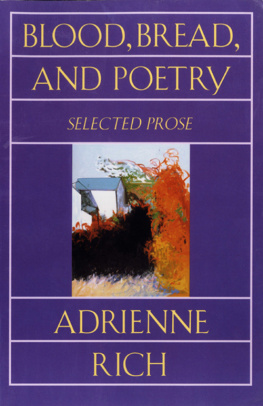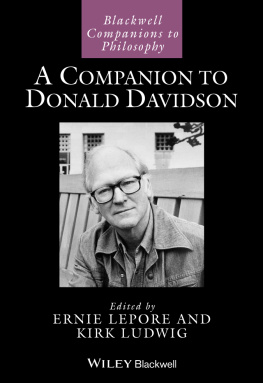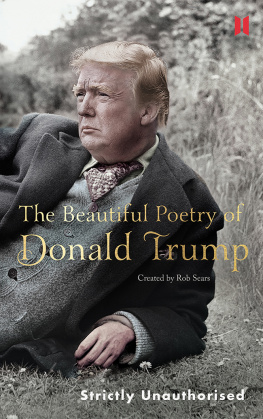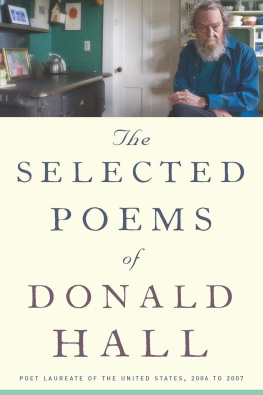| My grateful acknowledgments to the editors of the publications in which these heretofore uncollected pieces originally appeared: |
 |
| "The Metamorphoses of a Vampire," Reading Modern Poetry, 1955. |
 |
| "Chorus," Poetry, 1959. |
 |
| "Porch [first poem in 'South']," The Atlantic, 1982. |
 |
| "The Invention of Free Verse," The Iowa Review, 1985. |
 |
| "The Prose Sublime," Michigan Quarterly Review, 1988. |
 |
| "Dance Lessons of the Thirties," The New Criterion, 1988. |
 |
| "On a Woman of Spirit Who Taught Both Piano and Dance," The New Criterion, 1989. |
 |
| "Body and Soul," Antaeus, 1990. |
 |
| "Monologue in an Attic," Literary Outtakes, 1990. |
| From published work I have chosen writing I still like, or which others seem to. Mixed in are a few pieces, new and old, not reprinted before. All this has at best a sort of one-author unity, and it should be remembered that the author was several different persons during the course of writing, which covered many years. |
| The prose has been kept separate from the poems, but there is some crossover. The ending of one of the stories is retold as a poem, and the prose memoir is summarized twice over in a group of poems. In both cases the prose came first. Why this strikes me as logical I probably do not need to explain. |
| My poems are short, inevitably so, as it seems to me. There is only so much to be said on this or that subject, though I would like to think one may try the same subject from more than one angle. If Sherwood Anderson, one of my favorite writers, seems never to have had an idea longer than thirty or so pages, my own ideas come up even shorter. It is fair to say that I have so far remained unaffected by the American mania for epic. The truth is I would have written novels and five-act tragedies if I could have. |
| I am grateful to Robert Pack for suggesting the idea for this book. |
title : A Donald Justice Reader : Selected Poetry and Prose Bread Loaf Series of Contemporary Writers
author : Justice, Donald Rodney.
publisher : University Press of New England
isbn10 | asin : 087451567X
print isbn13 : 9780874515671
ebook isbn13 : 9780585244556
language : English
subject American fiction
publication date : 1991
lcc : PS3519.U825A6 1991eb
ddc : 811/.54
subject : American fiction
MIDDLEBURY COLLEGE PRESS
Published by University Press of New England,
Hanover, NH 03755
1991 by Donald Justice
All rights reserved
Acknowledgments appear on page 171
Printed in the United States of America 5 4 3 2 1 |
| CIP data appear at the end of the book |
|
| The Mnemonic value of meters seems always to have been recognized. There are, to begin with, the weather saws, counting spells, and the like, which one does more or less get by heart in childhood. But any ornament, however trivial and even meaningless, probably assists the recollection to some degree, if by ornament we mean a device of sound or structure not required by the plain sense of a passage. Repetition obviously functions in this wayanaphora, refrains, even the sort of repetition which involves nothing more than an approximate equivalence of length, as in Pound's Sapphic fragment: |
 |  |
Spring........
Too long......
Gongula...... |
| Likewise with such structural features as parallel parts or syllogistic order, whether in verse or prose. For that matter, fine and exact phrasing alone enables the memory to take hold about as well as anything. A friend of mine, at parties, preferred to recite prose rather than verse, usually, as I recall, the opening paragraph of A Farewell to Arms. |
| The purely mnemonic character of a passage, however, appears to contribute little to its esthetic power. Often enough rhymes are more effective mnemonically than meters, and occasionally other devices may prove to be. But the meters, where employed at all, are likely to be the groundwork underlying other figurations, hence basic, if not always dominant. Consider a couplet like ''Red sky at morning, / Sailor take warning." Here the meters cooperate with the rhymes to fit the lines to one another, not only as lines of verse but as linked parts of a perception. It is no more than a slight exaggeration to claim that the couplet becomes fixed in memory by reason of this sense of fittedness. But few devices of sound are enough in themselves to ensure recall. Should, for example, the sky of the couplet be changed from red to blue, although neither rhyme nor meter would be affected, I cannot believe the couplet would survive. Survival in this case has something to do with aptness of observation, with use, that is, as well as cleverness or beauty. The kernel of lore provides a reason for keeping the jingle: the jingle preserves the lore in stable form. |
| Now all this is to consider memory, as is customary, from the viewpoint of an audience, as if a signifcant purpose of poetry were simply to put itself in the way of being memorized. For my part, when I am at work on a poem, the memory of an audience concerns me less than my own. While the meters and other assorted devices may ultimately make the lines easier for an audience to remember, they are offering meanwhile, like the stone of the sculptor, a certain resistance to the writer's efforts to call up his subject, which seems always to be involved, one way or another, with memory. (Hobbes somewhere calls imagination the same thing as memory.) In any case, memory is going to keep whatever it chooses to keep not just because it has been made easy and agreeable to remember but because it comes to be recognized as worth the trouble of keeping, and first of all by the poet. The audience will find it possible to commit to memory only what the poet first recalls for himself. Anything can be memorized, including numbers, but numbers that refer to something beyond themselves, as to the combination of a safe, are the easier to keep in mind for that reason. Something other than themselves may likewise be hidden in the meters, and an aptness to be committed to memory might almost be taken as a sign of this other presence. Pattern is not enough. The trivial and insignificant pass beyond recall, no matter how patterned, discounting perhaps a double handful of songs and nonsense pieces, * where the pattern itself has somehow become a part of what is memorable. But such a result is exceptional. What happens in the more serious and ordinary case is that some recollection of a person, of an incident or a landscape, whatever we are willing to designate as subject, comes to seem worth preserving. The question for the poet is how to preserve it. |



